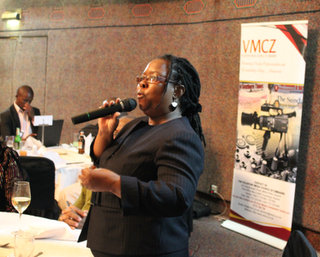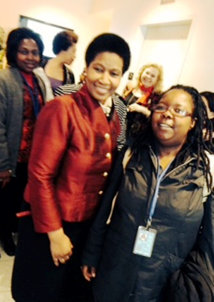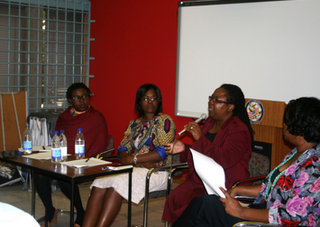Interview of the Month
Passionate about working for women’s rights at all levels and with all women, Virginia Muwanigwa is an expert in gender and women’s rights research, analysis, proposal writing; lobbying and advocating for women’s rights. As the Chairperson of the Women's Coalition of Zimbabwe, in addition to the WLZ, she has 8 years extensive use of human rights based approaches, 19 years working experience on socio-economic and political analysis in SADC and vast experience working with women and men at local and national level in both urban and rural.
She is a holder of an MBA, BSc Sociology Gender and Development studies as well as a diploma in Communication and Journalism and a Diploma in Workers’ Education. Virginia is currently the Chairperson of Women and Land in Zimbabwe and she is the Director of Humanitarian Information Facilitation Centre (HIFC).
MEWC talks to Virginia about her experiences in the Civil Society realm in Zimbabwe and was drives her to strive forward in achieving women’s empowerment, despite challenges:

Tell us about yourself and what inspires you.
I am a fun loving but seriously focused woman who is inspired by the belief that the contribution towards empowering women that each one of us makes draws us nearer to gender equality. That the resilience and will to succeed that women and girls continue to exhibit despite socio-economic, political and cultural factors being stacked against them will count for equal voice, choice and control, one day!
I am inspired, when life, both personal and professional realms becomes difficult, and that I have an opportunity to change things, but also by how I choose to respond and whom I choose to do it with. I have over the years built a social support network of women and men in my jobs, in church, and through the various initiatives I have been involved in.
Finally, my supportive family provides the peaceful, safe and loving environment that is so needed in this work. As a feminist mother of two boys, Nigel and Tanaka, I am inspired by the potential in boys and men to be partners in building a just and equal society and at a personal level to respect women as equals. I married my childhood sweetheart, Farai, 22 years ago and he is secure enough in himself and who he is to not be threatened by my success. Though many times things have been tough, I him to lean on for support.
How did you find your way to being such a passionate women’s rights and gender equality expert and advocate?
As a child, I was always chided by (mostly) my grandmother, who brought me up, for questioning certain norms that did not make sense to me. E.g. that girls could not wear trousers or that only girls had to do housework. I continued questioning these conventions into adulthood, where as a journalist, extensive research on socio-economic and political issues in SADC confirmed that there were disparities. That the differences were not a coincidence but a result of systemic conditioning that saw women and girls treated as second class.
I have been lucky to secure jobs that allowed me to do what I love – work with people, read, write, negotiate and share strategies to improve lives at a personal, community, national level and beyond. Most of my jobs have required extensive travel and that has also broadened my understanding of other peoples, cultures and values. I have to date travelled to at least 26 countries – Botswana, Lesotho, Malawi, Mauritius, Mozambique, Namibia, South Africa, Swaziland, Tanzania, Zambia in southern Africa. In the rest of Africa, I have been to Kenya, Mali, Ghana, Rwanda and Togo. Beyond that I have attended meetings in Canada, Denmark, Netherlands, Norway, Italy, France, Switzerland, German, UK and the USA.
A degree in Sociology and Gender Development Studies provided the academic analysis and principles in response to my earlier questions. Extensive immersion in the research environment helped to confirm that change would not only happen at a micro level which is the personal and even the household, but it needs to be buoyed up by a conducive environment resulting from legislative and other reforms at the macro level. This is at the community, national and international levels.
Since 1997, I have gained vast and varied experience on gender equality and women’s empowerment working in the trade union movement; poverty eradication; information, media and communications; gender and development; and more recently within the humanitarian sector. Between 1992-1997, I was not into advocacy but working as a Researcher/Writer in a sub-regional organisation.

Virgina with UN Women Director Phumzile Mlambo-Ngcuka during 2014 CSW meeting
How has your experience been lobbying and advocating for women’s rights in Zimbabwe? How successful have your endeavours been?
Coincidentally, my first experience lobbying was at an international level when in 1997, when an International Trade Secretariat as the Programme Coordinator hired me for the Women’s Programme in their Africa Regional Office. Although some of Zimbabwe’s trade unions were among those I worked with to transform the workplace into an equal and nurturing space for women, over the next four and half years, I did not consider myself as being part of the women’s movement but the labour movement.
It was only in 2002 that I formally ‘joined’ the women’s movement in Zimbabwe in the aftermath of the constitutional review process. Then my work was to advise on how to end poverty through mainstreaming gender. Some of the stakeholders included the Women’s Coalition of Zimbabwe and that grew into active collaboration that over the years exposed me to campaigns for gender budgeting, against gender based violence, media space for women in terms of content and also representation structurally; women’s rights to land and other resources.
Success has been in the policies, laws and more recently, the constitutional reform that ushered in a more gender sensitive supreme law. This success transforms to frustration with the slow pace of implementation of these instruments, across the board. Success has been in the way as women activists across organisations, political parties, age, class, ethnic and other differences, we were able to come together, with little or no resources, for strategic lobbying and go our separate ways when necessary to facilitate our ‘watchdog’ role.
At a personal professional level, success was winning my one award for Best Print News article in southern Africa, beating 186 other entries. While I am proud of the award and the article, on the then Domestic Violence Bill that we were lobbying for, the real significance is that I researched and started writing it for a long time. I finalised it one day after International Women’s Day, having seen bloody pictures of the mutilated body of a 27-year old woman, a nurse, who was stabbed by her boyfriend. That the murder happened on this IWD made me madder still. And that the media immediately capitalised on her death by sensationalising it as an event covered in a news story, rather than a feature to further analyse the issue in a deeper way, cognisant of the policy shortcomings. I do believe the anger is what impassioned me.
You’re a Chairperson and Board Member for the Women’s Coalition of Zimbabwe (WCOZ), what does your advisory role look like? Is the civil society realm in Zimbabwe effective?
As Chairperson of WCoZ, my advisory role includes: nurturing the organisational vision of a Zimbabwean society where women and girls fully enjoy their rights; defending our goal for gender equality through gender equity; promoting, protecting and advancing our mission to coordinate women and girls for collective action through mobilisation and organisation of women and girls, awareness and consciousness raising, lobbying and advocacy, capacity building and resource mobilization; providing policy oversight to our strategy implementation; taking responsibility and leadership for acknowledging and transforming internal and external conflicts which are evidence of organic rather than mechanical solidarity; ensuring the challenging expectation of accountability to our members and other stakeholders; and providing motivation to members and staff during difficult times.
As a leader, my overall role is to see the vision long before others do, or if not, to work with the other board members to get their buy in to and nurture the organisational vision.
Yes the civil society realm in Zimbabwe is effective, as its presence continues to be felt despite the socio-economic and political threats. No, because a lot more could be done with effective collaboration across sectors to ensure an integrated response to the issues Zimbabweans, male or female, are grappling with.
You are currently the Chairperson of Women and Land in Zimbabwe. How important are legal amendments and accountability on amendments to agriculture for Women in Africa, and Zimbabwe specifically?
Legal amendments and accountability to commitments on agriculture for women across Africa are important as they form the majority productive force within the sector at more than 70%.
Land and in turn, agriculture, are emotive issues from the perspective of resource distribution, utilization and control over means of production by a diversity of people and mediation can be strengthened by legislative means.
In a situation where legislative framework is not the problem but the implementation of selected reforms, accountability for delivery by leaders at every level is key. The Comprehensive Africa Agriculture Development Programme (CAADP) with its objectives to improve agriculture inevitably focuses on women, as the majority, in seeking a more equitable distribution of wealth for rural populations; and ensuring environmentally sound agricultural production and a culture of sustainable management of natural resources in Africa.
In Zimbabwe, the land redistribution exercise still needs transform the lives of the majority women, still living in poverty. One gain has been the recognition through the constitution of women’s rights to opportunities in the social, economic and political spheres. Specifically rights to agricultural land have also been conferred on women. This provides mandate for lobbying as the women’s movement.
How does your expertise and advocacy of gender equality play into your role as the Director of the Humanitarian Information Facilitation Centre (HIFC)?
My job as Director of HIFC basically marries my three areas of gender; media information and communications; and development. My key result areas are on capacity building for journalists and humanitarian NGOs.
More recently, strengthening the gender dimension to HIFC’s work is another expectation, which has been formalized but used to happen by virtue of my activism work. Milestones include the improved and increased number of deeply researched, analytical and policy-directed humanitarian reports now a regular feature in the national media; the three-year Women Journalists Mentoring Programme co-implemented by HIFC which facilitated the transfer of leadership and media skills to 45 young female journalists working with experienced mentors. Some of the young women have gone on to start their own initiatives, been promoted at work, started an association of female photographers; and replicated the mentoring in sports writing.
On the NGO side, the various networks created through collaborations with local, national and international organisations also serve as indicators of success. As a person, I am comfortable working at all levels, with people across diversity and can fit into any situation. I therefore equally derive satisfaction from being deep down in our rural, urban and peri-urban communities discussing livelihood and new family and household saving schemes as I am in the national, sub-regional and continental level and internationally, the corridors of the ILO Building in Geneva, or the UN headquarters in New York.
Zimbabwe’s recently amended Constitution of 2013 brought several progressive changes in favour of gender equality. In your expertise, what needs to be done to ensure there is accountability on these changes?
What needs to be done is two-pronged – mobilise women to demand the rights promised in the constitution as a way of testing the system - and also lobby for the translation of constitutional guarantees into justiciable rights through alignment with relevant laws. That will enable those who are tasked with delivery of the rights across sectors to be able to review and align their policies and or develop new ones.
These policies will guide government structures, both political and administrative to programme for, allocate resources and implement. The implementation is always a challenge and there is need to ensure that monitoring and evaluation of programmes analyses the gender equality gains. Some capacity building in gender mainstreaming is required as a continuous initiative as well as constitutional literacy among stakeholders.
That way they will know what is expected and hopefully be ready to negotiate priorities. Major challenges still exist in mainstreaming gender in policies, budgets and programmes in the various sectors of the economy as policy makers and technocrats have limited expertise in this area.

Gender and media discussion, marking World Press Freedom day. Harare, May 2014. T
Koliwe Majama, MISA, Susan Makore, CEO, ZIFM and Abigail Gamanya, FAMWZ
You have been honest about the need to integrate gender adequately in regional strategies for SADC, what does gender mainstreaming look like to you?
Gender mainstreaming to me is the pprocess of consciously ensuring that gender analysis informs and becomes an integral dimension of the formulation and design, planning and implementation, monitoring and evaluation of policies, strategies, programs and projects. Rigorous research and analysis is therefore needed to continuously gather evidence to inform stakeholders when planning and/ or reviewing policy.
And allocating resources to ensuring policy implementation is key as so many organisations have only mainstreamed gender on paper, never in practice. The experiences would serve as learning points for improving the mainstreaming.
Actually approaches are dependent on the organisation – whether to set targets, to have women specific programmes as affirmative action for past imbalances or to ensure that gender dimension transcends all areas.
In May you published a piece on Africa Day and the progress of gender equality goals across the continent. In this article you said “real women's empowerment is still minimal and gender equality, largely, elusive”. In your experience what would do you think is the most pressing empowerment area today?
Most pressing empowerment area today is women’s control over resources. What women have had and continue to have is access to resources for subsistence or because they are the ones providing the labour. However power over resources, although minimal is still firmly entrenched in men.
The resources include: knowledge, skills, technology, money, power and prestige, land, labor. The lack of resources has resulted the women trailing men in all the other areas of politics and decision-making; education, health, housing, environment, gender based violence, media you name it.
As long as women do not have equal access to voice, choice and control over productive resources, they will remain dependent on those who do, regardless of what the constitutions and other legal instruments say. It is important that the battle for empowerment comes to the mainstream economy at a national, regional and international level.
Thanks Virginia!
You can find her here:
Twitter: @v.muwanigwa
